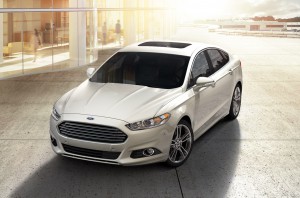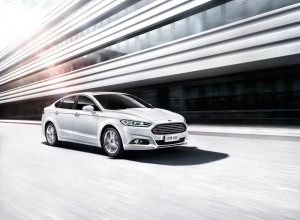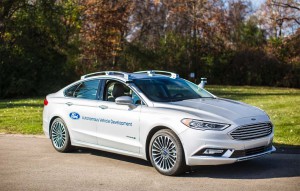Ford Motor Co. says it has no plan to consolidate production of its next-generation Fusion and Mondeo models in China for shipment to markets around the world, countering a report by Reuters.
On Wednesday, the news service referenced automotive suppliers and other sources to indicate the midsize sedans would move out of their current plants in Europe and Mexico with a facility in China taking over as Ford’s single production source. Ford earlier this year announced a similar strategy for the smaller Focus model.
“We have no plans to export the next-generation Fusion/Mondeo from China to North America and Europe,” Ford said in a statement responding to the wire report. “Fusion/Mondeo are an important part of the Ford car lineup. We will have more information to share about the next Fusion/Mondeo at a later date.”
Ford has been juggling its production plans as it lays out a strategy heavier on SUVs and lighter on the sedans, coupes and wagons that have been losing momentum in markets around the world. The second-largest Detroit automaker has also been shifting production allocations to make room for the new autonomous and electrified vehicles it plans to add to its line-up over the next few years.
Just last week, it announced plans to move EV production from a suburban Detroit factory to its plant in Cuautitlán, Mexico, starting in 2020. That will make room at the Flat Rock, Michigan facility for the fully-driverless vehicles Ford is currently developing.
(For more on this story, Click Here.)
Ford last year announced it would also move the Focus from a second Detroit-area plant to an all-new factory it was building in Mexico. That announced generated a sharp series of rebukes from then-candidate Donald Trump who warned he would enact a border tax on Ford if elected president. The automaker ultimately scrapped the plant – though Executive Vice President Joe Hinrichs told TheDetroitBureau.com the move was made for financial reasons, not politics. Instead of moving the Focus back to the U.S., it will now be sole-sourced from China for markets around the world.
That would be the highest-volume vehicle yet to be imported from China. So far, only a handful of models come from that market, including a Volvo sedan and the Buick Envision SUV.
The Reuters report indicated Ford was preparing to do the same thing with the midsize sedan sold in the U.S. as the Fusion and overseas as the Mondeo. Production for North America is currently based in Hermosillo, Mexico, with the Mondeo model coming out of a plant in Valencia, Spain.
Such a move would not have surprised many industry observers considering the sharp slide in sales of passenger cars as millions of American motorists – and more abroad – shift from conventional passenger cars to SUVs and crossover-utility vehicles, such as the Ford Escape and Explorer models.
Ford CEO Jim Hackett, who came onboard in May following a major management shake-up, has indicated he is open to a variety of changes in the automaker’s strategy – including production plans – in order to boost its bottom line.
Hackett is also an active proponent of Ford’s decision to reposition itself as a “mobility company,” rather than just an automotive manufacturer.
Ford plans to launch fully driverless vehicles by around 2021, initially focusing on sales to ride-sharing and other fleet customers. It hasn’t said what sort of vehicle or vehicles would be equipped with the technology. It is currently relying on modified Fusion sedans for testing but could shift to crossovers or vans when it begins production.
(GM wants to get a leg up on Ford, launch first driverless ride-sharing vehicles by 2019. Click Here for the latest.)
Ford’s decision to announce plans for Fusion and Mondeo production “at a later date,” meanwhile, could reflect the broader concern the auto industry has about ongoing negotiations aimed at revising the quarter century-old North American Free Trade Agreement. Automakers have been actively resisting Trump Administration proposals that might make it more difficult to operate a production network across the U.S., Canada and Mexico.
“We agree NAFTA should be revised after 25 years but hope it will be done in productive ways that doesn’t have unexpected consequences,” General Motors CEO Mary Barra said on Monday, noting that the automakers clearly addressed their concerns during a recent meeting with Vice President Mike Pence.
(For more on Mary Barra’s comments about NAFTA, tax reform, sexual harassment and more, Click Here.)



